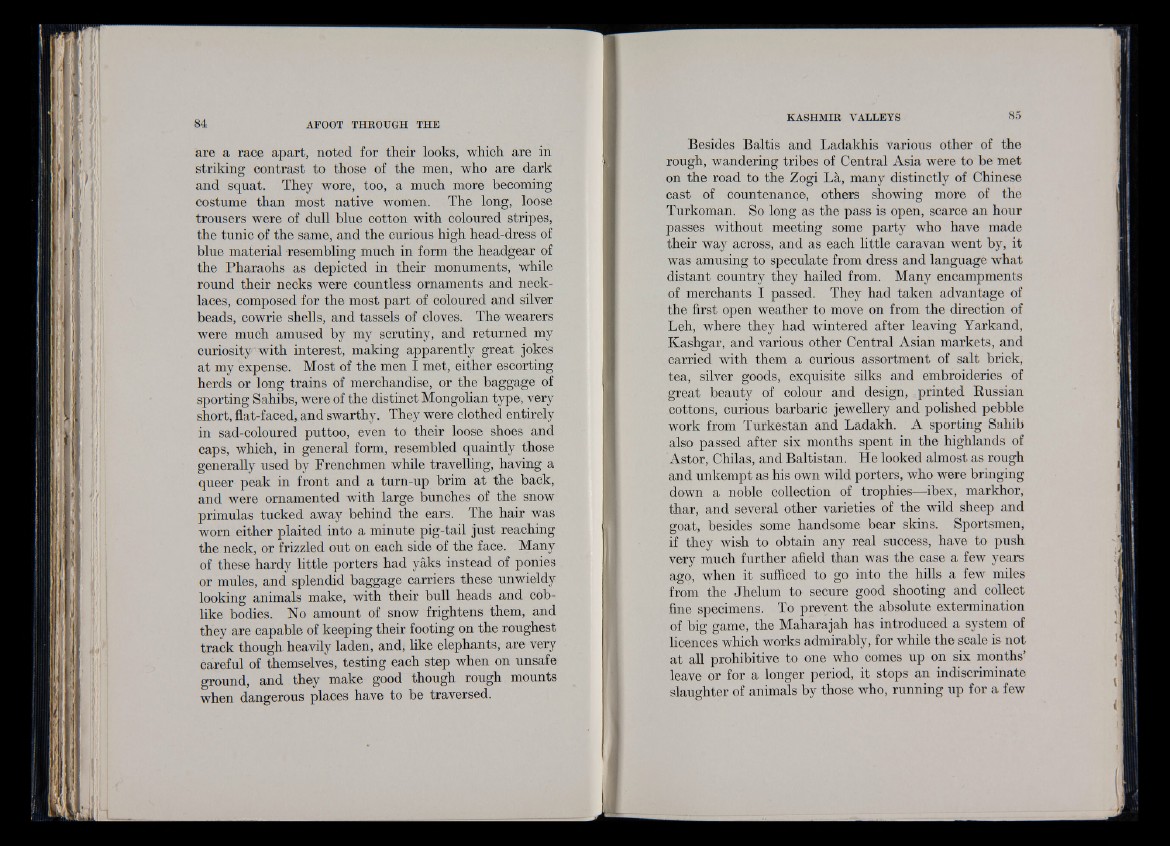
are a race apart, noted for their looks, which are in
striking contrast to those of the men, who are dark
and squat. They wore, too, a much more becoming
costume than most native women. The long, loose
trousers were of dull blue cotton with coloured stripes,
the tunic of the same, and the curious high head-dress of
blue material resembling much in form the headgear of
the Pharaohs as depicted in their monuments, while
round their necks were countless ornaments and necklaces,
composed for the most part of coloured and silver
beads, cowrie shells, and tassels of cloves. The wearers
were much amused by my scrutiny, and returned my
curiosity' with interest, making apparently great jokes
at my expense. Most of the men I met, either escorting
herds or long trains of merchandise, or the baggage of
sporting Sahibs, were of the distinct Mongolian type, very
short, flat-faced, and swarthy. They were clothed entirely
in sad-coloured puttoo, even to their loose shoes and
caps, which, in general form, resembled quaintly those
generally used by Frenchmen while travelling, having a
queer peak in front and a turn-up brim at the back,
and were ornamented with large bunches of the snow
primulas tucked away behind the ears. The hair was
worn either plaited into a minute pig-tail just reaching
the neck, or frizzled out on each side of the face. Many
of these hardy little porters had yaks instead of ponies
or mules, and splendid baggage carriers these unwieldy
looking animals make, with their bull heads and coblike
bodies. No amount of snow frightens them, and
they are capable of keeping their footing on the roughest
track though heavily laden, and; like elephants, are very
careful of themselves, testing each step when on unsafe
ground, and they make good though rough mounts
when dangerous places have to be traversed.
Besides Baltis and Ladakhis various other of the
rough, wandering tribes of Central Asia were to be met
on the road to the Zogi La, many distinctly of Chinese
cast of countenance, others showing more of the
Turkoman. So long as the pass is open, scarce an hour
passes without meeting some party who have made
their way across, and as each little caravan went by, it
was amusing to speculate from dress and language what
distant country they hailed from. Many encampments
of merchants I passed. They had taken advantage of
the first open weather to move on from the direction of
Leh, where they had wintered after leaving Yarkand,
Kashgar, and various other Central Asian markets, and
carried with them a curious assortment of salt brick,
tea, silver goods, exquisite silks and embroideries of
great beauty of colour and design, printed Bussian
cottons, curious barbaric jewellery and polished pebble
work from Turkestan and Ladakh. A sporting Sahib
also passed after six months spent in the highlands of
Astor, Chilas, and Baltistan. He looked almost as rough
and unkempt as his own wild porters, who were bringing
down a noble collection of trophies—ibex, markhor,
thar, and several other varieties of the wild sheep and
goat, besides some handsome bear skins. Sportsmen,
if they wish to obtain any real success, have to push
very much further afield than was the case a few years
ago, when it sufficed to go into the hills a few miles
from the Jhelum to secure good shooting and collect
fine specimens. To prevent the absolute extermination
of big game, the Maharajah has introduced a system of
licences which works admirably, for while the scale is not
at all prohibitive to one who comes up on six months’
leave or for a longer period, it stops an indiscriminate
slaughter of animals by those who, running up for a few